★★★★
“Squid Games? They’re over-rated.”

 What is it with Koreans and revenge? From Lady Vengeance through Princess Aurora to The Five, it seems an integral part of about half of their cinematic canon. This goes down the same line, but despite that familiarity, delivers an intensity that’s hard to resist, and provides an excellent action heroine. Indeed, in terms of Netflix series from Korea, I’d say this was more worthy of worldwide acclaim than Squid Game. But I guess there’s no accounting for taste.
What is it with Koreans and revenge? From Lady Vengeance through Princess Aurora to The Five, it seems an integral part of about half of their cinematic canon. This goes down the same line, but despite that familiarity, delivers an intensity that’s hard to resist, and provides an excellent action heroine. Indeed, in terms of Netflix series from Korea, I’d say this was more worthy of worldwide acclaim than Squid Game. But I guess there’s no accounting for taste.
The central character here is Yoon Ji-woo (Han), a teenager whose father is part of the Dongcheon, a major criminal syndicate. She’s somewhat estranged from him, but when he is gunned down, literally on her doorstep, she wants vengeance on those responsible. The cops seem largely disinterested in solving the case of a dead mobster, and the only person who wants to help is her late father’s boss, Choi Mu-jin (Park), the head of the Dongcheon. He tells Yoon her father was killed with a police revolver and sets her up as his undercover operative in the force, in order to identify the murderer and take her revenge.
It’s a long process, taking several years. It begins with her training in martial arts in the Dongcheon gym, then adopting a new identity of Oh Hye-jin, joining the police and working her way to the department run by the man suspected of her father’s killing, Cha Gi-ho (Kim). There, she bonds with another detective, Jeon Pil-do (Ahn), but the moral landscape gets increasingly murky. It turns out that there may be more to her circumstances than she has been told, with one revelation in particular upending everything she had believed since her father’s death.
This is a very strong effort, particularly at the beginning and end. Yoon’s status as a “take no shit” type is quickly established with a classroom brawl against bullies, and her tenacity and persistence in the search for her father’s killer is absolutely relentless. You can knock her down – and many times, that’s exactly what happens – but she keeps on getting back up. The action scenes here are extremely well-staged, and Han is clearly doing almost everything herself, rather than a stunt double. I did feel the show lagged somewhat in the middle, with the focus moving to Choi and his struggle for control of the syndicate. In particular, there’s a thoroughly unpleasant rival whom he kicked out, but who returns, with venom, for a take-over bid. Yoon ended up rather backgrounded in parts 3-5 of the eight episode show.
But the ending of part 6 is the revelation mentioned above, yanking the carpet out from under the viewer, every bit as much as Yoon, and gets the show firmly back on track. It’s not the final shocking moment, though I do have some questions about the motivation of certain characters for their actions. Still, it builds to a climax which, in hindsight, should have been almost inevitable from the start. It ties up everything nicely, and in an emotionally satisfying way. Where are the Western shows that offer such a solid combination of action and drama?
Dir: Kim Jin-min
Star: Han So-hee, Park Hee-soon, Ahn Bo-hyun, Kim Sang-ho





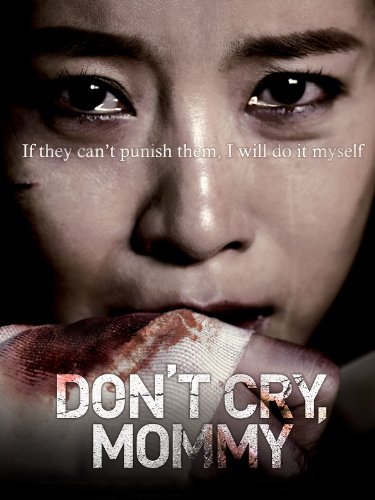 I say that, since this Korean film appears to have been at least a partial inspiration for not one, but two Bollywood films which were recently reviewed here:
I say that, since this Korean film appears to have been at least a partial inspiration for not one, but two Bollywood films which were recently reviewed here: 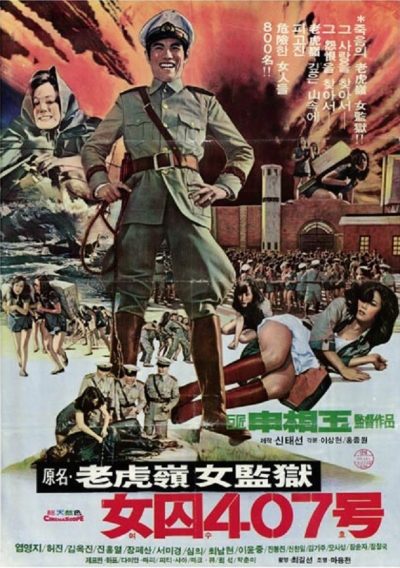 An apparent knock-off of Japan’s
An apparent knock-off of Japan’s  Moving onto part two, things have… changed. Part one ended with its sole survivor sailing off in a boat. This opens with its two heroines, Kuan Mou-Hua (Yip) and Kao Chuan Tze (Heo), back running through the jungle, apparently escaping from… something. I actually watched this part first, and initially presumed the specifics were all explained in the previous installment. I can now confidently state: nope. Like so much here, even down to the location, it’s unclear. Perhaps the untranslated captions shed light on this; the dubbing (the version I saw was in German with English subs!) certainly doesn’t.
Moving onto part two, things have… changed. Part one ended with its sole survivor sailing off in a boat. This opens with its two heroines, Kuan Mou-Hua (Yip) and Kao Chuan Tze (Heo), back running through the jungle, apparently escaping from… something. I actually watched this part first, and initially presumed the specifics were all explained in the previous installment. I can now confidently state: nope. Like so much here, even down to the location, it’s unclear. Perhaps the untranslated captions shed light on this; the dubbing (the version I saw was in German with English subs!) certainly doesn’t.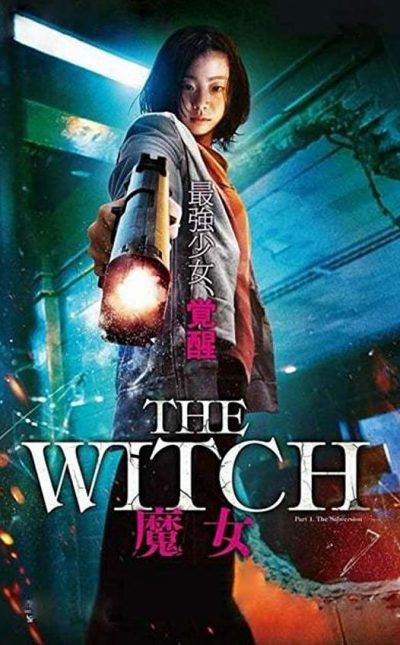 The first in an intended trilogy, this stands on its own reasonably well, balancing between tying up the loose ends and leaving the future uncertain. The heroine is Ja-Yoon (Kim), who begins by escaping from a shadowy, quasi-governmental facility as a raw eight-year-old, despite being hunted by the woman in charge, Dr. Baek (Jo) and her minions. She is found by husband and wife farmers, and they adopt Ja-Yoon, who has no apparent memory of her early life as their own. Ten years later, with Mom suffering from Alzheimer’s, and the farm struggling financially, Ja-Yoon enters a nationwide singing contest. However, the resulting attention brings her firmly back on the radar of Dr. Baek and Nobleman (Choi), the other survivor from that night a decade ago. The not-so-good doctor won’t let Ja-Yoon escape this time.
The first in an intended trilogy, this stands on its own reasonably well, balancing between tying up the loose ends and leaving the future uncertain. The heroine is Ja-Yoon (Kim), who begins by escaping from a shadowy, quasi-governmental facility as a raw eight-year-old, despite being hunted by the woman in charge, Dr. Baek (Jo) and her minions. She is found by husband and wife farmers, and they adopt Ja-Yoon, who has no apparent memory of her early life as their own. Ten years later, with Mom suffering from Alzheimer’s, and the farm struggling financially, Ja-Yoon enters a nationwide singing contest. However, the resulting attention brings her firmly back on the radar of Dr. Baek and Nobleman (Choi), the other survivor from that night a decade ago. The not-so-good doctor won’t let Ja-Yoon escape this time. An amiable piece of light fluff from Korea, while this probably doesn’t need to be 117 minutes long, the time passed comfortably enough. After many years of failing the civil service entrance exam, Jang Young-shil (Kang) finally succeeds and is rewarded with a contract job in the national security agency. However, she’s still mediocre, and is laid off. Fortunately, she overhears her boss (Jo) having been phone-phished out of $500,000 of departmental funds, and is the only agent available to go undercover in the ‘boiler room’ carrying out these scams. There, she recognizes another employee, Na Jung-an (Han) – having seen her take out a pickpocket on the subway, she knows Na is an undercover cop. The two women, of sharply disparate backgrounds and skill-sets, form an uneasy alliance, seeking to take down the charismatic boss of the con company, Min Seok (Namkoong).
An amiable piece of light fluff from Korea, while this probably doesn’t need to be 117 minutes long, the time passed comfortably enough. After many years of failing the civil service entrance exam, Jang Young-shil (Kang) finally succeeds and is rewarded with a contract job in the national security agency. However, she’s still mediocre, and is laid off. Fortunately, she overhears her boss (Jo) having been phone-phished out of $500,000 of departmental funds, and is the only agent available to go undercover in the ‘boiler room’ carrying out these scams. There, she recognizes another employee, Na Jung-an (Han) – having seen her take out a pickpocket on the subway, she knows Na is an undercover cop. The two women, of sharply disparate backgrounds and skill-sets, form an uneasy alliance, seeking to take down the charismatic boss of the con company, Min Seok (Namkoong).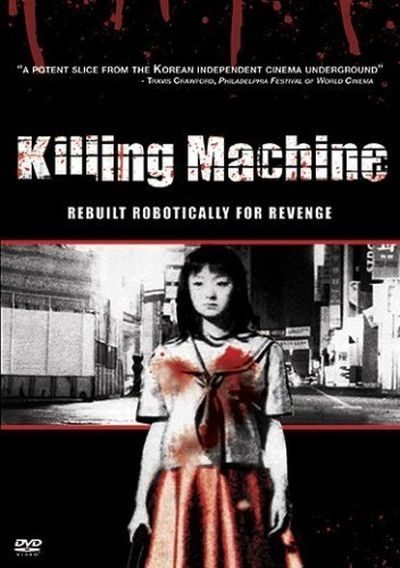 You’ll understand why, when skimming leisurely through a streaming channel on the Roku, I screeched to a halt at this title. Even though the “official” English title is just Killing Machine, I knew I immediately had to watch it. Yet, while the title
You’ll understand why, when skimming leisurely through a streaming channel on the Roku, I screeched to a halt at this title. Even though the “official” English title is just Killing Machine, I knew I immediately had to watch it. Yet, while the title 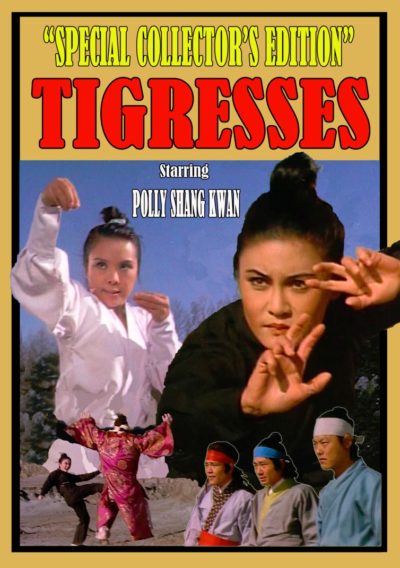 After their parents are killed by Ji-Gyeum Yoon (Kim Y-i), who wants to take over their father Sung’s position, sisters Su-Yung and An-Yung are split up and sent off for their safely, each owning half of a jade pendant. Fifteen years later, An-Yung (Shang Kwan) begins to take her vengeance on the usurper – not just physically, but also waging psychological warfare, sending him notes to ensure he knows he is being targeted, although not initially why or who. Though I’m a little surprised Yoon doesn’t figure it out immediately, given he’s still so paranoid about Sung’s daughters coming out, he freaks out when left alone with a maid, stating the position given in the tag-line above.
After their parents are killed by Ji-Gyeum Yoon (Kim Y-i), who wants to take over their father Sung’s position, sisters Su-Yung and An-Yung are split up and sent off for their safely, each owning half of a jade pendant. Fifteen years later, An-Yung (Shang Kwan) begins to take her vengeance on the usurper – not just physically, but also waging psychological warfare, sending him notes to ensure he knows he is being targeted, although not initially why or who. Though I’m a little surprised Yoon doesn’t figure it out immediately, given he’s still so paranoid about Sung’s daughters coming out, he freaks out when left alone with a maid, stating the position given in the tag-line above. The 16-part series proved an unexpected sleeper hit in its native land, more than doubling the audience from debut to finale. This is all over the place in terms of genre, with comedy, thriller, romance and action threads. While they aren’t equally successful, it does a pretty decent job of managing most of them, and is surprisingly accessible for a Western audience. The heroine is Do Bong-soon (Park B-Y), the latest in a matriarchal line of very strong women. She has been brought up to keep her power suppressed, due to the potential issues it can cause; Bong-soon has also been warned that if she misuses them, and hurts an undeserving person, they will go away. [Let’s not worry too much about how this presents an easy solution: slap one innocent, and she would become just like everyone else…]
The 16-part series proved an unexpected sleeper hit in its native land, more than doubling the audience from debut to finale. This is all over the place in terms of genre, with comedy, thriller, romance and action threads. While they aren’t equally successful, it does a pretty decent job of managing most of them, and is surprisingly accessible for a Western audience. The heroine is Do Bong-soon (Park B-Y), the latest in a matriarchal line of very strong women. She has been brought up to keep her power suppressed, due to the potential issues it can cause; Bong-soon has also been warned that if she misuses them, and hurts an undeserving person, they will go away. [Let’s not worry too much about how this presents an easy solution: slap one innocent, and she would become just like everyone else…]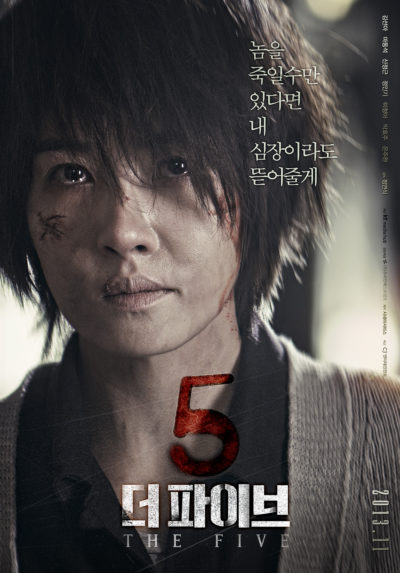 A chance encounter in a convenience store destroys the life of Go Eun-ah (Kim). For her young daughter accidentally sees serial killer Oh Jae-wook (On) abducting his next victim. Realizing he has been spotted, Jae-wook carries out a brutal home invasion, killing both the daughter and Eun-ah’s husband, and leaving her permanently paralyzed. But he has reckoned without Eun-ah’s fortitude. She devotes the rest of her life to tracking down her attacker, and puts together a team of four to help her. All need transplants, for them or their family. So Eun-ah has promised that once Jae-wook has been captured, delivered to her and killed, she will give them her organs. Damn. That’s what I call “fully committed”… But when Jae-Wook realizes he is being hunted, he turns his attentions on the hunters.
A chance encounter in a convenience store destroys the life of Go Eun-ah (Kim). For her young daughter accidentally sees serial killer Oh Jae-wook (On) abducting his next victim. Realizing he has been spotted, Jae-wook carries out a brutal home invasion, killing both the daughter and Eun-ah’s husband, and leaving her permanently paralyzed. But he has reckoned without Eun-ah’s fortitude. She devotes the rest of her life to tracking down her attacker, and puts together a team of four to help her. All need transplants, for them or their family. So Eun-ah has promised that once Jae-wook has been captured, delivered to her and killed, she will give them her organs. Damn. That’s what I call “fully committed”… But when Jae-Wook realizes he is being hunted, he turns his attentions on the hunters.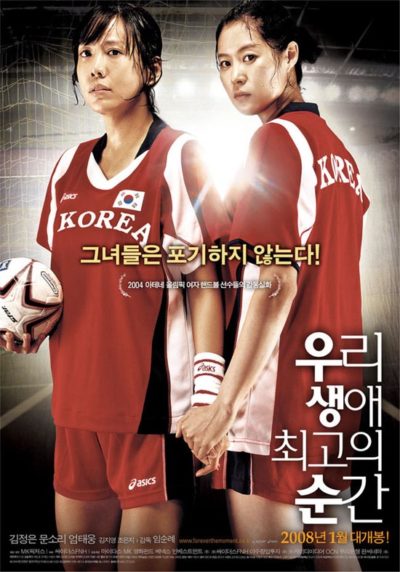 Every four years, when the Olympics arrive, we fall in love with handball. What is handball, you might be asking. Basically, think seven-a-side soccer, except (obviously), played with the hands rather than feet. It’s an amazing sport, all but unknown in the UK and US, and deserving a far wider audience – a YouTube search for “Olympics handball” will get you sorted. Which is why we were fascinated by the idea of a film focusing on it, specially, the story of the 2004 South Korean women’s team. What they did was roughly that country’s equivalent of the 1980 ‘Miracle on Ice’. The once-dominant Korean team had fallen far from grace, and barely qualified for the Athens Olympics. But they reached the final, against the Danish side, which went into double overtime, and then a penalty shootout.
Every four years, when the Olympics arrive, we fall in love with handball. What is handball, you might be asking. Basically, think seven-a-side soccer, except (obviously), played with the hands rather than feet. It’s an amazing sport, all but unknown in the UK and US, and deserving a far wider audience – a YouTube search for “Olympics handball” will get you sorted. Which is why we were fascinated by the idea of a film focusing on it, specially, the story of the 2004 South Korean women’s team. What they did was roughly that country’s equivalent of the 1980 ‘Miracle on Ice’. The once-dominant Korean team had fallen far from grace, and barely qualified for the Athens Olympics. But they reached the final, against the Danish side, which went into double overtime, and then a penalty shootout.